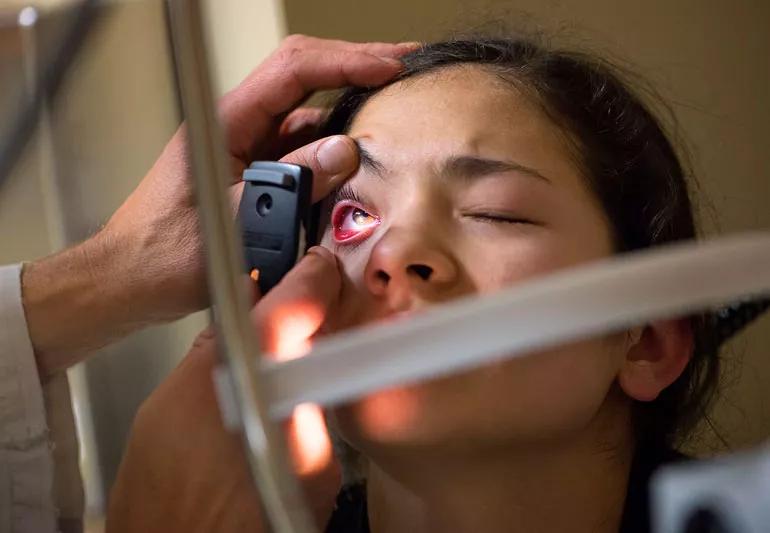Find out what to treat yourself and when to get help

Image content: This image is available to view online.
View image online (https://assets.clevelandclinic.org/transform/138a56ae-10db-437c-8e53-3f6cb0b85ff3/eyeInjurySafety-530781175-770x533-1_jpg)
docotr checks patient with eye injury
Even if you do your best to protect your eyes, accidents do happen. Then you wonder if it’s OK to rub it or whether you should rinse it — and whether to call for help.
Advertisement
Cleveland Clinic is a non-profit academic medical center. Advertising on our site helps support our mission. We do not endorse non-Cleveland Clinic products or services. Policy
Most eye injuries, like getting soap or a tiny foreign body in the eye, are minor. Others, such as those that occur in some work environments or during sports play, require prompt medical attention.
If you’re looking for the best way to treat an eye injury or how to remove an irritant or object stuck in your eye, these tips from ophthalmologist Peter McGannon, MD, are for you:
“Whether it’s a grain of sand, eyelash, or other tiny object, your first instinct may be to rub your eye, but don’t do it,” says Dr. McGannon.
Rubbing the eye — or trying to remove an object with your finger — may end up abrading the cornea and creating a much more serious situation, he says.
Instead, allow your tears to flow in response to the irritation. If that doesn’t flush it out, rinse the eye with clean water or with sterile saline solution. If your eye continues to bother you, or the foreign body remains, contact your eye doctor or head to the nearest urgent care or ER if an your eye doctor is not available.
Industrial chemicals and some household cleaning solutions cause serious damage when splashed into the eye.
If you get a chemical solution in your eye, rinse it out with clean water or saline solution immediately and thoroughly, preferably for at least 15 minutes. You may need to hold the eye open to allow the water or saline solution to properly flush it out.
Advertisement
Immediately seek medical attention after flushing to make sure no serious harm occurred. “Any time you work with chemicals at a job, or even when you use strong household cleaning products, you should be wearing eye protection,” says Dr. McGannon.
People of all ages play sports and, at some point, may suffer a blow to the eye from a ball or some other object during a game.
“Gently hold a cold compress or ice pack against the eye, taking care not to put any pressure on it,” Dr. McGannon says. “Keep your head upright to reduce swelling.”
Visit your local urgent care center or eye doctor if pain persists or if the injury affects your vision.
A puncture wound to the eye requires immediate attention in an urgent care or emergency room setting. Don’t attempt to flush out or remove anything stuck in the eye and avoid rubbing your eye and the area around it.
“Protect your eye from accidental pressure or rubbing by covering it with a firm, circular object such as a foam or paper coffee cup,” says Dr. McGannon.
Tape the protective cover over the eye, preferably with first aid tape. Have someone drive you immediately to the nearest emergency room for evaluation.
Unless it’s a very minor cut in the skin around the eye, this injury typically requires immediate medical attention, Dr. McGannon says.
Do not attempt to wash a cut eye or eyelid. Instead, without adding pressure to the eyeball, apply a clean cloth or sterile bandage to the area. Avoid using fluffy cotton or similar materials around the eye because fibers could stick in the area and cause more pain and irritation.
Seek immediate evaluation at an urgent care or emergency center.
Accidents sometimes occur despite our best preventive efforts. But take a mindful, deliberate approach to eye protection and safety and you may avoid the worst ones, Dr. McGannon says.
“Properly fitted, activity-specific eye protection can go a long way toward preventing some of the most serious trauma to the eyes,” he says.
Always wear eye protection when you:
It’s also a good idea to keep specific supplies for treating eye injuries in your home first aid kit. Purchase these at your local pharmacy and you’ll be prepared to properly cope with most any future eye injuries.
Advertisement

Delivered every Tuesday!
Sign up for our Health Essentials emails for expert guidance on nutrition, fitness, sleep, skin care and more
Learn more about our editorial process.
Advertisement
Nocturnal lagophthalmos may be caused by damaged nerves or muscles in your face
Act quickly when a chemical or object gets in your eye
The answer depends on your condition
Plus how pools, lakes and sprinklers affect your eyes
Be sure to protect your eyes from UV light and hazardous materials
Types of eye doctors and what they do
The Short Answer from an optometrist
It’s critical to have the proper eyewear if you plan to look up at the sun, especially during the total solar eclipse on April 8, 2024
Type 2 diabetes isn’t inevitable with these dietary changes
Applying a hot or cold compress can help with pain
Pump up your iron intake with foods like tuna, tofu and turkey